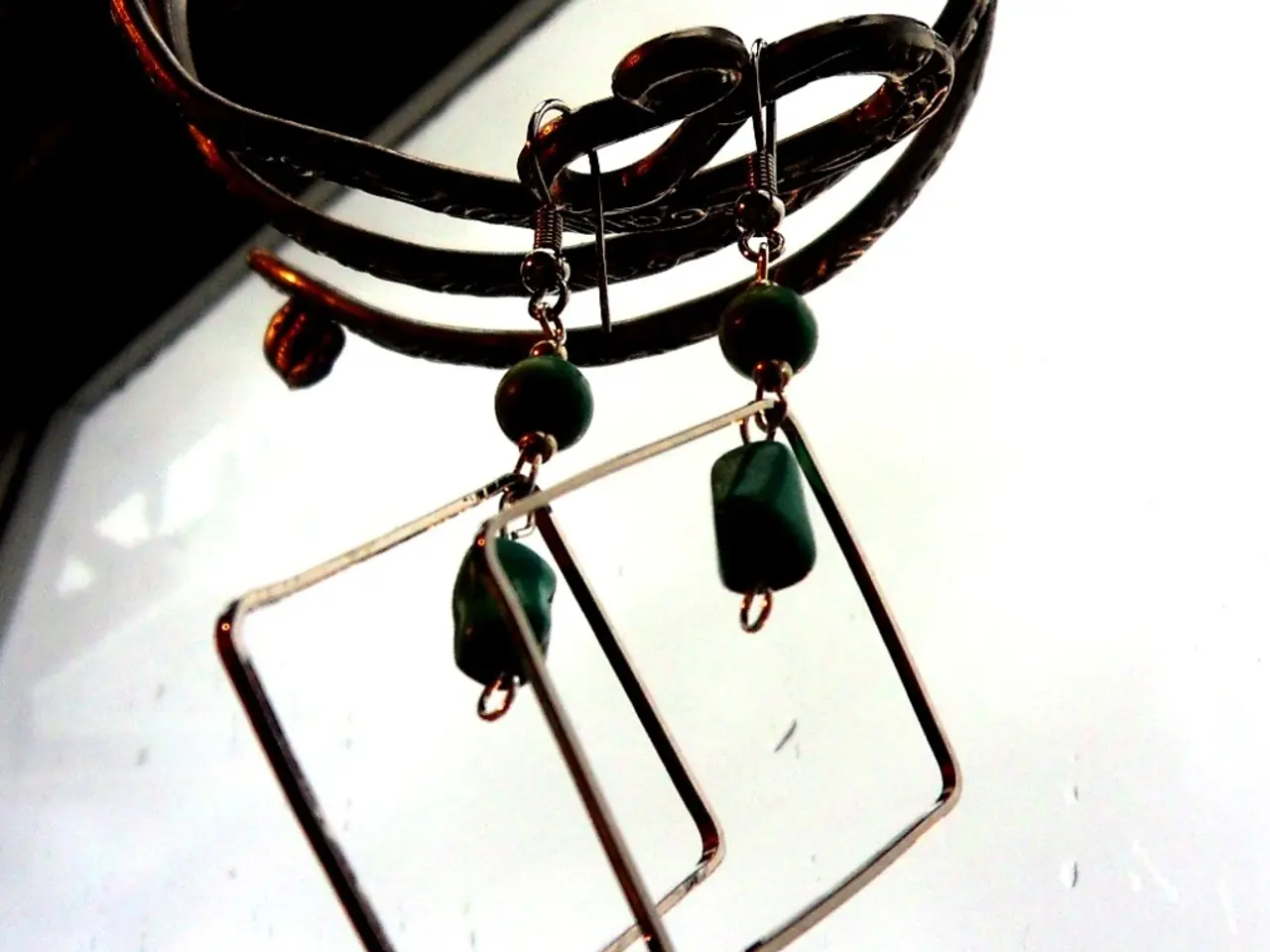Tinnitus that pulses in rhythm: Understanding the causes, signs, and possible remedies
Pulsatile tinnitus, a rhythmical noise that beats at the same rate as the heart, is a type of tinnitus that is different from other forms as it has a physical source [1]. This condition is caused by changes in blood flow near the ear, which can be due to various factors such as atherosclerosis, increased blood flow, localized increased flow, or turbulent blood flow [1].
Vascular abnormalities are one of the common causes of pulsatile tinnitus. These can include conditions like venous hum, high riding or dehiscent jugular bulb, sigmoid sinus diverticulum, cervical atherosclerosis, carotid artery aneurysm or dissection, and dural arteriovenous fistulas or malformations [1].
Tumors, particularly paragangliomas and hemangiomas affecting the facial nerve or cavernous areas, can also lead to pulsatile tinnitus [1]. Middle ear disorders, inner ear disorders, and other conditions like idiopathic intracranial hypertension and vasculitis can also contribute to this condition [1].
In cases where pulsatile tinnitus is suspected, a thorough medical evaluation is crucial. This may involve examining the inside and outside of the ear, checking for treatable problems like infections or excess earwax, and performing additional tests like MRI or ultrasound scans to study blood vessels and check the pressure inside the head [1]. Specialists may also examine the eyes, head, and neck, and perform a hearing test [1].
Treatment for pulsatile tinnitus depends on addressing the underlying cause and alleviating symptoms. Medical and surgical treatment may involve correcting vascular lesions, surgical removal of tumors, and treating underlying conditions like atherosclerosis or vasculitis [4]. Medications such as benzodiazepines, carbamazepine, and steroids may provide relief in some cases [2].
Behavioral therapies, including tinnitus retraining therapy (TRT), cognitive-behavioral therapy (CBT), and biofeedback, can help patients cope with the distress caused by tinnitus [2]. Masking devices, electronic devices or hearing aids that produce white noise or environmental sounds, can make tinnitus less noticeable [4]. The FDA-approved Lenire device, which uses combined audio and tongue stimulation, can be used at home to reduce tinnitus symptoms [2].
Untreated pulsatile tinnitus can negatively impact a person's quality of life. However, many self-management approaches can help reduce symptoms. These include sound therapy, relaxation, and cognitive behavioral therapy [5]. It is essential to consult a healthcare professional for an accurate diagnosis and appropriate treatment.
References: [1] American Tinnitus Association. (n.d.). Pulsatile Tinnitus. Retrieved from https://www.ata.org/understanding-tinnitus/types-tinnitus/pulsatile-tinnitus [2] National Institute on Deafness and Other Communication Disorders. (n.d.). Tinnitus. Retrieved from https://www.nidcd.nih.gov/health/tinnitus [3] National Institute on Deafness and Other Communication Disorders. (n.d.). Tinnitus: Causes. Retrieved from https://www.nidcd.nih.gov/health/tinnitus/causes [4] American Academy of Otolaryngology—Head and Neck Surgery Foundation. (2019). AAO-HNSF Position Statement: Management of Tinnitus. Retrieved from https://www.entnet.org/content/aao-hnsf-position-statement-management-tinnitus
- Macular degeneration and other eye-health issues can compound the distress of tinnitus, making it more challenging for patients to cope.
- The science of medical-conditions has made significant strides in understanding the connection between digestive-health and chronic-diseases like type-2-diabetes and obesity.
- CBD, a popular natural supplement, has shown promising results in alleviating symptoms of autoimmune-disorders and neurological-disorders such as multiple-sclerosis and migraines.
- Asthma, COPD, and other respiratory-conditions can worsen hearing issues, potentially leading to tinnitus as a secondary effect.
- Ankylosing spondylitis, a type of arthritis, often displays neurological symptoms that may overlap with various chronic-diseases and neurological-disorders.
- Spondylitis and other types of arthritis can lead to hearing loss and tinnitus, further impacting a person's quality of life.
- Depression, a common mental-health issue, can exacerbate the effects of chronic-diseases and chronic-kidney-disease, often leading to diminished fitness-and-exercise and overall health-and-wellness.
- The connection between skin-care and mental-health is being increasingly explored, with studies showing links between psoriasis and depression.
- Hepatitis and other liver-related medical-conditions can indirectly contribute to hearing loss and tinnitus by affecting overall health.
- In addition to impacting cardiovascular-health, smoking can increase the risk of developing various chronic-diseases and cancer, including breast-cancer.
- Type-2-diabetes and obesity can lead to various skin-conditions such as acanthosis nigricans, further stressing an individual's health-and-wellness.
- Chronic-diseases and cardiovascular-health are closely intertwined, with heart disease being a leading cause of death in people with type-2-diabetes.
- The FDA-approved Lenire device could potentially be used to treat the symptoms of various chronic-diseases and neurological-disorders, such as type-2-diabetes and migraines.
- Many therapies-and-treatments for predictive diseases like cancer, autoimmune-disorders, and neurological-disorders focus on managing symptoms rather than curing the diseases.
- Tinnitus retraining therapy (TRT) and other behavioral therapies can help manage symptoms of chronic-diseases like diabetes and mental-health issues like depression.
- The workplace-wellness movement is gaining traction, with employers offering nutrition counseling and fitness facilities to combat conditions like obesity and diabetes.
- Atherosclerosis, or plaque buildup in the arteries, is a common cause of pulsatile tinnitus and various chronic-diseases related to cardiovascular-health.
- Certain skin-conditions, such as psoriasis, can also be indicative of underlying medical-conditions like inflammatory bowel disease (Crohn's) or autoimmune disorders.
- The prevalence of Alzheimer's disease and other neurological-disorders among the elderly highlights the need for comprehensive healthcare and wellness programs.
- Underlying conditions like obesity, depression, and chronic-kidney-disease can lead to deteriorated mental-health and eventual diabetes or other chronic-diseases.
- Diabetes, a chronic-disease affecting millions worldwide, can lead to various health complications, including kidney disease, cardiovascular-health issues, and hearing loss.
- Cancer treatments, such as chemotherapy and radiation, can have severe side-effects like hearing loss and tinnitus, further impacting a patient's quality of life.
- Stress, a common issue in today's fast-paced society, can trigger or worsen symptoms of mental-health conditions, such as bipolar disorder and depression.
- Regular exercise and a balanced diet can go a long way in managing chronic-diseases like obesity, diabetes, and hearing loss, improving overall health-and-wellness.








